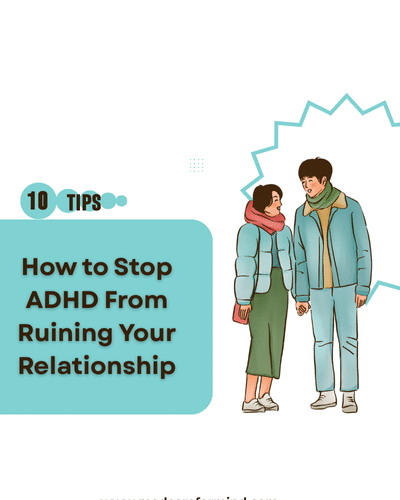Do people with ADHD lose interest in relationships?
Yes, people with ADHD can sometimes lose interest in relationships, but it’s not due to a lack of love or care. ADHD affects how the brain responds to stimulation and routine. At the beginning of a relationship, everything feels exciting and new, which naturally keeps someone with ADHD highly engaged. However, as time goes on and things become more predictable, their brain may crave novelty, leading to distraction or emotional distance.
Creating shared routines, exploring new activities together, and maintaining open communication can reignite attention and closeness. These simple changes help stop ADHD from losing interest in a relationship by keeping both partners mentally and emotionally engaged. Recognizing the need for variety and interaction allows the relationship to evolve in a way that supports both people.
Emotional regulation can also play a role. People with ADHD might struggle with managing feelings during conflict or when overwhelmed, which can create emotional distance. Addressing these moments calmly and supportively helps maintain trust and connection. Seeking outside support, such as couples counseling or ADHD coaching, can also make a big difference.
How to Stop ADHD Losing Interest in Relationships: 5 Tips
When someone with ADHD seems to lose interest in a relationship, it’s often not about love fading; it’s about how their brain works. ADHD brains thrive on excitement and stimulation, which can make long-term relationships feel less exciting over time.
To stop someone with ADHD from losing interest in a relationship, both partners need to understand this dynamic and take active steps to keep the connection alive. Here are five clear, effective tips to help maintain emotional closeness and long-term interest.
1. Keep Things Fresh and Engaging
Introduce new experiences, even small ones, into your routine. Try new activities, explore new places, or switch up daily habits together. Variety stimulates the ADHD brain and helps stop someone with ADHD from losing interest in a relationship by keeping things exciting and mentally engaging.
2. Use Clear and Honest Communication
Avoid vague language or assumptions. Talk openly about feelings, expectations, and challenges. ADHD partners may miss subtle emotional cues, so direct communication helps prevent misunderstandings and supports ongoing connection.
3. Create Structure and Consistency
Daily routines and shared responsibilities build stability. Use calendars, checklists, or reminders to stay organized together. These simple tools help reduce stress and quietly stop someone with ADHD from losing interest in a relationship by reinforcing teamwork and dependability.
4. Focus on Emotional Connection
Set aside time to connect emotionally, even if it’s just for a few minutes each day. Ask how your partner is feeling, share your thoughts, and be fully present. Regular emotional check-ins strengthen intimacy and help keep attention from drifting.
5. Consider Professional Support
Therapy or ADHD coaching can provide personalized strategies for staying connected. These resources help both partners learn how to manage attention shifts, emotional triggers, and daily challenges. These are key elements that help stop someone with ADHD from losing interest in a relationship and keep the bond strong.
How Can You Tell if ADHD Is Causing Red Flags in a Relationship?
Recognizing if ADHD is behind red flags in a relationship starts with understanding how the condition affects behavior and communication. People with ADHD may struggle with focus, emotional control, and follow-through, which can sometimes be mistaken for a lack of interest or commitment. If your partner frequently forgets important details, interrupts conversations, or seems emotionally distant, these may not be signs of neglect; they could be symptoms of untreated or unmanaged ADHD. Being aware of these patterns is the first step to stop someone with ADHD from losing interest in relationships and avoiding unnecessary conflict.
Another red flag linked to ADHD is inconsistent attention. At the beginning of the relationship, everything may feel intense and passionate. Over time, that same partner may seem distracted or disconnected. Noticing this change early allows both partners to work together to stop someone with ADHD from losing interest in the relationship and bring back the emotional connection.
Repeated conflict over small issues can also point to ADHD as a deeper cause. Emotional outbursts, defensiveness, or impulsive behavior can lead to arguments or misunderstandings. If the same problems keep coming up without resolution, it may be time to explore ADHD as a possible root cause.
 What ADHD-Related Red Flags Should You Be Aware of When Dating?
What ADHD-Related Red Flags Should You Be Aware of When Dating?
Is It Normal to See Red Flags When Dating Someone With ADHD, or Is It Something Else?
Not every challenge in a relationship with someone who has ADHD is because of the condition. It’s essential to separate what is ADHD-related from what might be signs of deeper relationship issues. For example, frequent dishonesty, manipulation, or disrespect are not caused by ADHD and shouldn’t be excused. If your partner shows no effort to understand how ADHD affects the relationship or refuses to take steps to manage it, that could be a serious concern.
Watch how your partner handles challenges. Are they willing to grow, communicate, and take accountability? If so, the relationship can succeed with the right tools and support. Being honest about what’s working and what’s not will help you decide whether to invest more or move on.
What’s the Best Way to Argue Constructively With Someone Who Has ADHD?
The best way to argue constructively with someone who has ADHD is to stay calm, clear, and focused on the issue, not the emotion. People with ADHD may struggle with emotional regulation, meaning they can react more strongly or impulsively during conflict. Avoid yelling, sarcasm, or sudden confrontations, as these can quickly escalate the situation.
It’s also important to choose the right time and environment for the discussion. Arguing in the heat of the moment, especially when someone with ADHD feels overwhelmed, can make communication harder. If emotions are running high, take a short break and return to the conversation later. Choose a quiet setting with minimal distractions so your partner can stay engaged.
Focus on solutions, not blame. Use “I feel” statements instead of accusations, and work together on what can be done differently next time. For example, say, “I feel hurt when plans change last minute, can we find a way to stay on track better?” This keeps the conversation grounded in mutual needs and shared goals. When both partners feel heard and respected, even tough conversations can bring you closer.
How Can You Communicate Effectively During an Argument With Someone Who Has ADHD?
Why Do Arguments With Someone Who Has ADHD Feel So Intense, and How Can You Manage Them?
Arguments with someone who has ADHD can feel more intense because ADHD affects how the brain processes emotions. People with ADHD often experience emotional dysregulation, meaning their emotional responses can be stronger and faster than expected. What might be a small disagreement for one person can feel overwhelming to someone with ADHD. They may raise their voice, interrupt, or shut down entirely, not out of disrespect, but because their brain is struggling to manage the stress of the moment.
Managing these intense moments starts with slowing things down. If the argument becomes too heated, suggest taking a break. This doesn’t mean ignoring the issue. It gives both people time to calm their nervous systems and think more clearly. When you return to the discussion, speak in a calm, even tone, and try to stick to one point at a time. ADHD brains can easily get overwhelmed by too much information or emotional overload. Keeping things simple and respectful makes it easier for both of you to feel heard.
Make sure to follow up after the argument. Many people with ADHD may forget what was discussed or struggle to hold onto emotional closure if the issue isn’t resolved. Revisit the conversation once things have settled, summarize what was agreed upon, and reinforce any changes you both want to make moving forward.
How Do You Resolve Conflicts Peacefully When Arguing With a Partner Who Has ADHD?
Resolving conflicts peacefully with a partner who has ADHD starts with using clear, calm communication. People with ADHD often struggle with emotional control and staying focused, especially during arguments. To avoid confusion, speak in short and direct sentences. Avoid yelling or criticizing, as this can make your partner feel overwhelmed or defensive. Instead, use a steady tone and explain how you feel without blaming.
Choose the right time and place to talk. If your partner is distracted, upset, or tired, wait until they are calm before bringing up a serious issue. Find a quiet place with no distractions so they can pay attention. If the argument gets too intense, suggest taking a break and returning to the topic later. These steps reduce stress and give both of you a chance to think clearly. With patience and respect, you can prevent the situation from getting out of control.
Work together on solutions. Instead of pointing out only what went wrong, talk about what can be done differently next time. For example, say, “Let’s try setting reminders so we don’t forget important plans,” or “Can we agree on a better way to handle this in the future?” This shows teamwork and care. When both partners feel heard and supported, it becomes easier to move forward without resentment.
How to Support Someone with ADHD In a Relationship
Supporting someone with ADHD in a relationship starts with understanding their unique challenges. ADHD affects attention, memory, emotional regulation, and impulse control. This doesn’t mean your partner is careless or inconsiderate; it means their brain processes things differently.
Be honest, but kind. ADHD can make it hard for your partner to pick up on subtle hints or emotional cues, so be direct about your feelings and needs. Use simple, specific language instead of general complaints.
Create structure and support systems together. Shared calendars, reminders, routines, or visual lists can help with forgetfulness and time management. Rather than criticizing missed tasks, work as a team to find solutions that work for both of you. Celebrate progress, no matter how small, and be flexible when things don’t go perfectly.
Don’t forget to care for yourself. Supporting someone with ADHD doesn’t mean ignoring your own needs. Set boundaries, ask for help when needed, and consider couples counseling if communication becomes difficult. A balanced, respectful partnership is possible with effort, understanding, and shared growth.
How to Help Someone with ADHD Calm Down?
Helping someone with ADHD calm down starts with creating a calm and safe environment. When a person with ADHD feels overwhelmed, their brain can go into overdrive, making it hard to think clearly or regulate emotions. Speak in a soft, steady tone and avoid raising your voice or reacting with anger. Remove distractions if possible, turn off loud sounds, lower bright lights, or move to a quieter space.
Offer simple choices or actions to help them feel more in control. Ask, “Would you like to take a walk or sit quietly for a few minutes?” Instead of saying, “Calm down,” which can feel dismissive, try, “I’m here for you—what do you need right now?” This shows support without pressure.
Breathing exercises, listening to calming music, or using grounding techniques like holding a cold object or focusing on five things around them can also help bring their attention back to the present. Later, when emotions settle, gently discuss what helped and what didn’t. This builds trust and makes future moments easier to handle.
 How to Help Someone with ADHD and Depression
How to Help Someone with ADHD and Depression
What Should You Know About Texting Habits When Dating Someone With ADHD?
When dating someone with ADHD, it’s important to understand that their texting habits may not follow the usual patterns. People with ADHD often struggle with time management, forgetfulness, and attention shifts. This means your partner might text frequently one day, then go quiet the next, not because they’ve lost interest, but because they’ve become distracted or overwhelmed.
ADHD can also affect how quickly or thoughtfully someone replies. You may receive long, enthusiastic texts at random times or brief, scattered replies that seem out of context. Rather than taking it personally, try setting clear communication preferences together. A simple check-in like, “Hey, I don’t need a long reply, just let me know you’re okay,” can ease pressure and keep the connection strong.
Help your partner understand how communication makes you feel valued. They may not always remember to check in, but reminders, shared calendars, or gentle cues can help. With honest conversations and mutual understanding, you can build a texting rhythm that works for both of you.
How Can You Improve Communication Over Text When Dating Someone With ADHD?
Improving communication over text when dating someone with ADHD starts with understanding how their mind works. People with ADHD may get easily distracted, forget to reply, or send messages at unpredictable times.
Let your partner know what kind of messaging helps you feel connected, without putting pressure on them to constantly respond. For example, you might say, “A quick good morning text means a lot to me,” or, “It’s okay if you reply later, just let me know you saw my message.” This creates a healthy structure without making them feel overwhelmed.
Use texting as a tool to strengthen, not replace, real communication. Light messages like “thinking of you” or reminders about shared plans can be helpful without feeling demanding. Avoid serious conversations over text if your partner gets anxious or distracted easily; save those for in-person or phone talks.

 How to Maintain a Relationship with Someone with ADHD?
How to Maintain a Relationship with Someone with ADHD? What are ADHD men like in relationships?
What are ADHD men like in relationships? Why Is Texting Challenging When Dating Someone With ADHD, and How Can You Handle It?
Why Is Texting Challenging When Dating Someone With ADHD, and How Can You Handle It?





